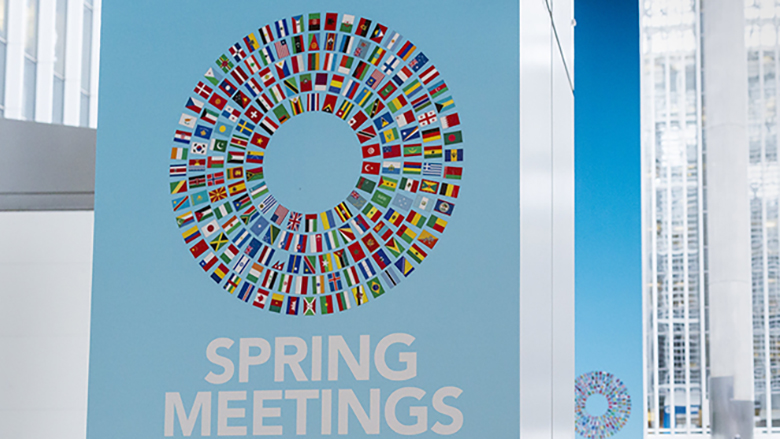Between 17-19 April, Finance Ministers, Central Bank Governors and civil society organizations from around the world gathered for the Spring Meetings, in Washington, DC to discuss the state of the global economy and reforms of the international financial architecture.
The week started with a re-commitment to the status quo, with the IMF reappointing Kristalina Georgieva at its helm and upholding a longstanding unwritten agreement between the transatlantic powers by which the World Bank is led by a US national and the IMF by a European one, in practice once again excluding the rest of the world from the leadership of the top international financial institutions.
More broadly, the week was characterized by mild progress and a few statements of good intentions but lacked ambitious commitments to seriously tackle global challenges. With debt service payments reaching historic highs, investment in development and climate initiatives risks being severely compromised.
Developing countries are facing a dire situation, and the World Bank and the IMF could do much more to help, with the support of G7 and G20 leaders. Inequality is high or increasing in 60% of low- and middle-income countries served by these institutions, and debt servicing to external creditors has reached peak levels: on average, low income countries devote 14% of their tax revenues to external debt service payments, more than what they spend on health and education.
Debt poses a significant threat to climate action, as emerging nations face the dilemma of servicing debt or investing in sustainable development and building resilience. The Vulnerable Climate Forum (V20), a group of 68 nations most vulnerable to climate impacts representing 1.7 billion people, warned that climate vulnerable countries have lost $525 billion in the last 20 years due to climate change, while their external debt servicing is expected to rise by 55% between 2019-2024, from $78.6 billion in 2019 to $122.1 billion. Research shows that at least 47 developing countries will face unsustainable debt burdens if they scale up their investment to the levels needed to meet the Sustainable Development Goals (SDGs) and the Paris Agreement goals.
The IMF Global Sovereign Debt Roundtable, which brings together debtor countries and creditors, issued its second progress report, highlighting some progress towards a shared understanding of comparability of treatment and of timelines and information sharing procedures. However, the World Bank’s Chief Economists as well as civil society organizations continued to point to the failure of the Common Debt Framework agreed by G20 countries in 2021 to guarantee expedited debt restructuring. They called for a fundamental overhaul of the debt sustainability framework and a revision of the IMF Resilience and Sustainability Trust, launched in 2021 by the IMF during the Italian G20 Presidency, as minimum conditions for ensuring that the international financial framework is adequate to address the intersecting challenges of debt distress and climate change.
The first meeting of the Expert Review on Debt, Nature and Climate was held on the sidelines, led by Vera Songwe, former UN Under-Secretary-General, and Moritz Kraemer, Chief Economist at LBBW. It is exploring debt for nature/climate swaps, sustainability-linked bonds, and possible improvements to the IMF’s Debt Sustainability Analysis methodology.
Donor countries are under pressure to break the $100-billion mark for the World Bank’s International Development Association (IDA) as net finance flows to developing countries turn negative.
Global net financial transfers to developing countries have fallen to their lowest level since the global financial crisis in 2008, down to $51billion, because the increase in debt repayments leaving developing countries has been followed by a decline in private investment and financial aid.
The poorest countries are suffering the most: recent data show that one in three countries eligible for concessional finance under the IDA are now poorer than they were before the onset of the pandemic. As the largest source of concessional and grant finance for the world’s poorest countries, the IDA has served as a vital lifeline, particularly when other financing sources have faltered.
At the close of last year, World Bank President Ajay Banga challenged donors to make IDA21 a record replenishment, surpassing the $93 billion achieved in the previous round and aiming at least $100 billion. While the full IDA21 financing package is still taking shape, with donors engaged in early-stage negotiations, the statement by the G7 at the Spring Meetings fell short of providing the reassurances needed to meet Banga’s ambitious call. While expressing support for a robust IDA21 replenishment, there was no concrete joint commitment to meet the growing funding needs.
Some progress in the World Bank’s Evolution Roadmap and the Multilateral Development Banks (MDBs) reforms Agenda: new financial commitments and progress on the callable capital governance.
Some progress was achieved in the reforms needed to increase the spending capacity of MDBs, including the World Bank. As part of the Capital Adequacy Framework (CAF) reform agenda, the World Bank and other MDBs published reports examining callable capital procedures and governance with the aim of helping rating agencies better assess the value of callable capital, ultimately to expand their financial capacity. MDBs shareholders issued a statement demonstrating their support for the MDBs’ use of callable capital.
The World Bank also obtained new financial commitments from most G7 countries in support of the implementation of its Evolution Roadmap, including new commitments of $11 billion for the Portfolio Guarantee Platform, the hybrid capital mechanism, and the new Livable Planet Fund, which will expand IBRD lending by around $68 billion over the next ten years. The latter is meant to enhance cooperation in addressing global challenges and is in line with the World Bank’s commitment to devote 45% of its annual financing to climate-related projects by 2025 and its ‘bigger, better and bolder’ framework, which is however already under scrutiny for its excessive emphasis on private-sector-led development and its continued indirect support for fossil fuel projects.
The World Bank, in collaboration with the African Development Bank, has also launched a new initiative to provide electricity access for at least 300 million people in Africa by 2030.
Momentum builds for new international tax proposals.
Momentum is growing for innovative instruments of international taxation on wealth, fossil fuels and polluting activities, which could generate substantial new public finance for the investment needed to achieve development and climate objectives.
Brazil’s ambitious proposal to implement a global tax on the super-rich gained significant traction during the G20 discussions, receiving backing from France’s Finance Minister Bruno LeMair, the head of the IMF and two Nobel prize winners: Joseph Stiglitz and Esther Duflo. The Finance Minister Fernando Haddad emphasized Brazil’s commitment to building international consensus on wealth taxation, working with G20 Finance Ministers towards a joint declaration in July. This move underscores a growing recognition among policymakers that tax evasion is not an inevitable outcome but rather a policy choice, as highlighted in the latest Global Tax Evasion Report.
The first official meeting of the new International Tax Task Force, co-chaired by Kenya, Barbados, and France, also took place last week, reconfirming its plan to develop concrete proposals for the implementation of climate-related international tax measures at COP30 in 2025.
In conclusion, the evolving global economic landscape and the dramatic situation faced by many vulnerable countries are making reforms of the international financial architecture more compelling and urgent than ever. While the World Bank, the IMF and the G7 and G20 have been making some moves to generate the finance needed to address pressing global challenges, the need remains for bolder, more comprehensive and innovative approaches to enable a prosperous, resilient and sustainable future for all as well as a more just global economic governance. The 2024 G7 under the Italian Presidency, whose members make up almost 40% of the World Bank’s voting shares, can start addressing some of these shortcomings through the G7 Finance Ministerial on 23-25 May and the G7 Summit on 13-15 June. Bolder political will and smarter policy design are the most critical elements needed for a step change that would build the conditions for a more peaceful and prosperous planet.
Photo World Bank / Simone D. McCourtie – https://www.worldbank.org







